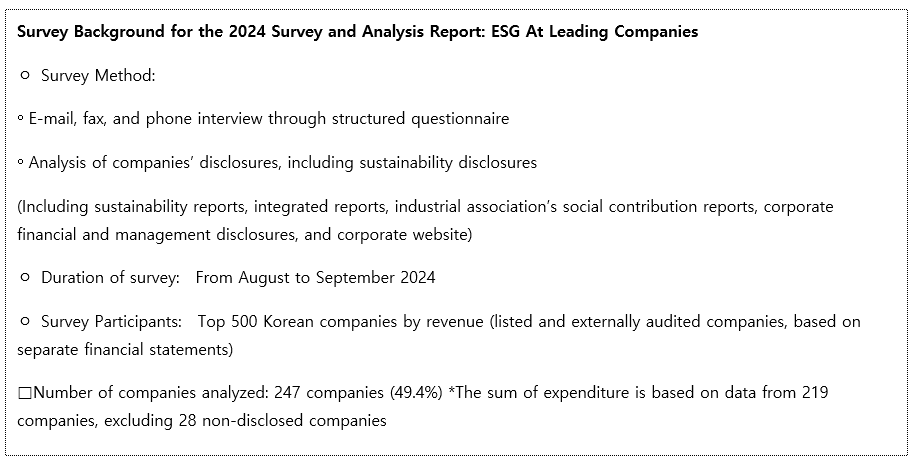News & Events
Press Releases
2024 Survey and Analysis Report: ESG At Leading Companies
|
Average social contributions spending among companies in 2023
was 16.1 billion won, the highest in the last 5 years
• Companies’ social contributions spending increased by 5%, despite a sharp decline among surveyed companies’ average profits by 37.6%
• The greatest number of new social contributions spending programs fell under the Environment (23.9%) category, and the proportion of the Youth (8.5%) category has increased by more than 2-fold
• “CO-EXIST,” is the corporate social contributions keyword selected by the FKI
• The Environment ESG category received the most attention: Investments into Environment and Safety increased by more than 2-fold on the previous year
Average social contributions spending reported among companies in 2023 has reached a 5-year high, and the greatest number of new social contributions spending programs fell under the Environment category.
The report finds that social contributions spending, on average, was 16.07 billion won, a 5% increase on the previous year. These are the highest levels of spending in the past 5 years. Total social contributions spending in 2023 was 3.5191 trillion won, a 0.5% decrease1) on the previous year.
1) (2022) 260 companies surveyed; total spending of 3.5367 trillion won, average spending of 15.31 billion won
(2023) 219 companies surveyed; total spending of 3.5191 trillion won, average spending of 16.07 billion won
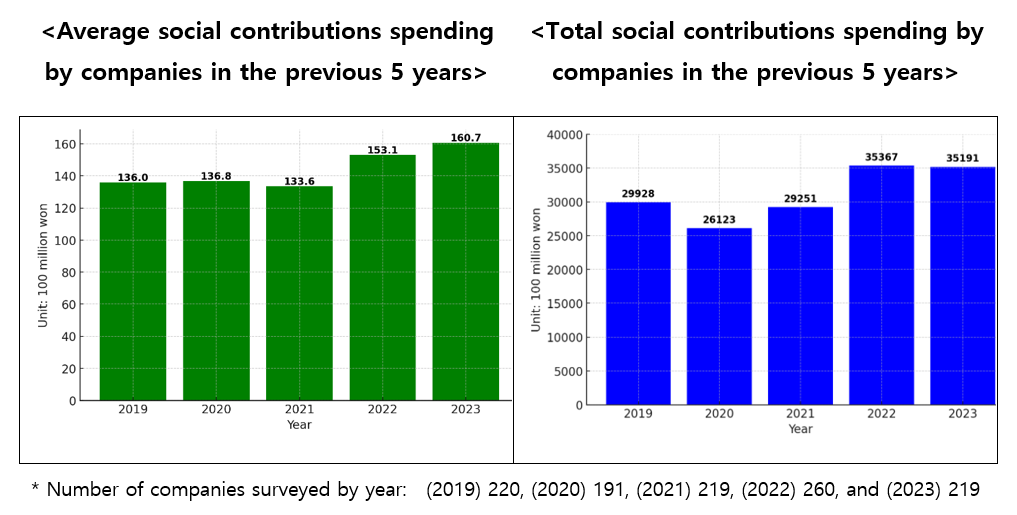
In spite of companies’ average profits dropping 37.6% from 776.7 billion won, in 2022, to 484.7 billion won, in 2023, their average social contributions spending rose by 5.0%. Notably, 9.1% (20 companies) of the companies analyzed pushed social contributions activities forward, even though they recorded a loss in pre-tax profits. The FKI remarked, “Despite recording a negative performance, companies have nevertheless increased social contributions spending and engaged in lively social contributions activities.”
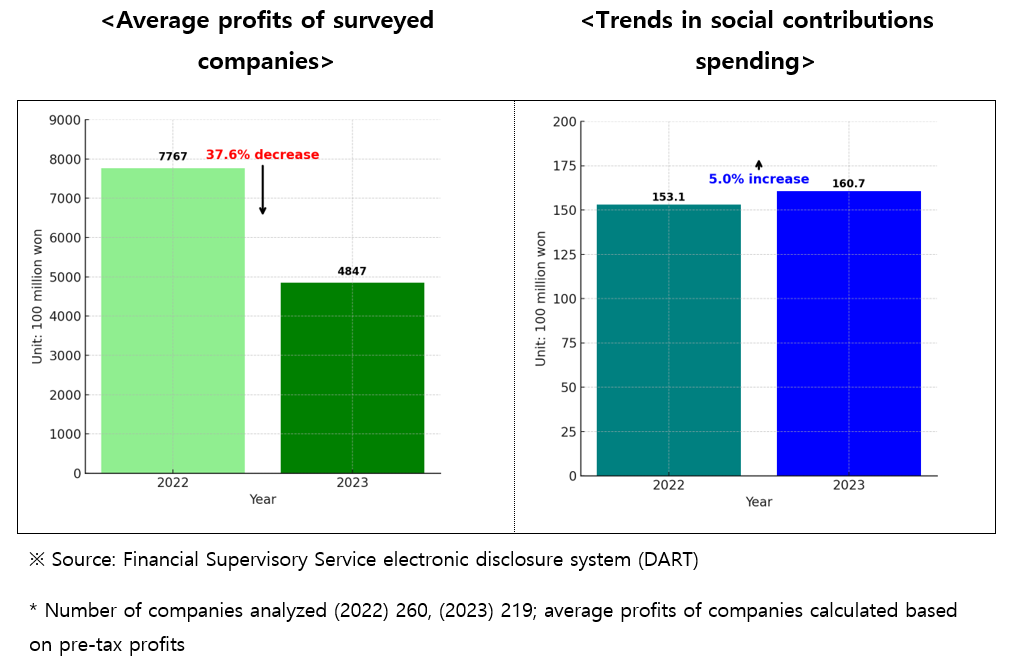
According to the survey, the rapid rise of environment-related regulations worldwide has led to many companies’ active participation in new social contributions spending programs, such as greenhouse gas emissions reduction and management, the circular economy, investment into and product development of ecofriendly technologies, and environmental preservation.
An analysis of new social contributions spending programs initiated last year finds that the greatest number of new social contributions spending programs fell under the Environment (23.9%), followed by Children and Adolescents (21.8%), and Local Community Development (15.6%). Notably, the proportion of Youth category programs has increased by more than 2-fold (4.1% in 2022 → 8.5% in 2023). The FKI explained, “The increase to the Youth category can be attributed to social contributions trends in numerous companies such as expansion of practical mentoring programs for those seeking employment as well as active operations of startup campuses and startup support programs.”

“CO-EXIST2),” has been selected as the corporate social contributions keyword by the FKI. The FKI further said, “These figures signify Korean companies’ innovative efforts in active deployment of social contributions and ESG management as well as cooperation with expert partners to resolve social issues.”
2) CO-EXIST: COllective + EXcellence + Impact + Sustainablity + Technology
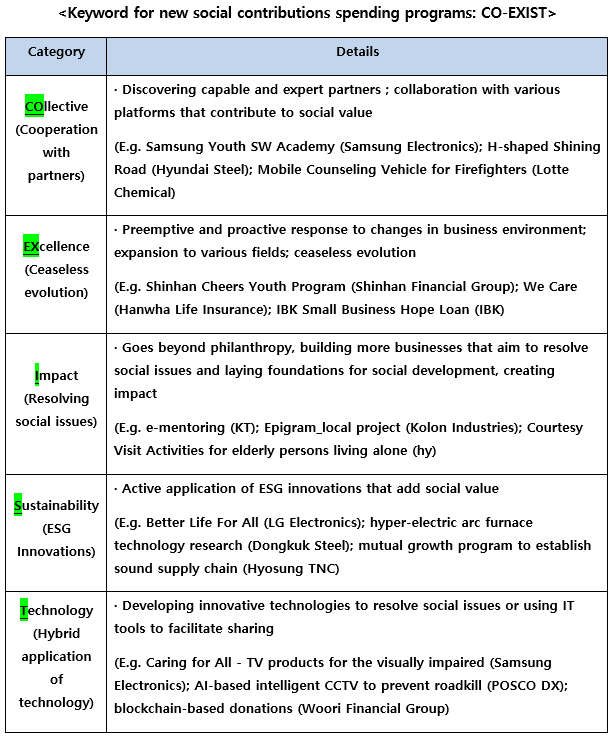
Companies have reported that they are focusing most on the following ESG categories, in descending order: Environment (40.2%), Society (36.0%), and Governance (23.8%). The most significant issues in each category were reported as follows: ▲Environment: Greenhouse gas emissions reduction and energy management (55.2%) ▲Society: Safety and Health (28.1%) ▲Governance: Compliance and ethical management (37.0%).
Nearly half (47.2%), or 236 companies among the top 500 Korean companies by revenue are disclosing data on greenhouse gas emissions, and the number of companies disclosing Scope 3 data, or all indirect greenhouse gas emissions in a company’s value chain, is also rising steadily: ▲(2021) 101 companies ▲(2022) 127 companies ▲2023 155 companies. Investments in Environment and Safety, such as ecofriendly CAPEX, purchase of ecofriendly products, and environmental pollution prevention have reached 34 trillion 221.2 billion won in 2023, an increase of more than 2-fold (113.7%) on the previous year.
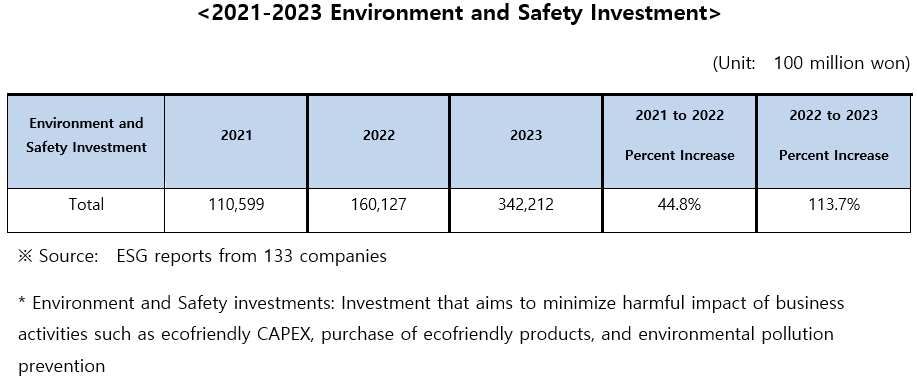
In descending order, the biggest reported hurdles in pushing ESG management forward were: Responding to ESG related regulations or policies, such as sustainability disclosures (39.3%); Related cost burdens (17.2%); and Low awareness or cooperation within the organization for ESG management (15.6%).
Sang Yoon Lee, head of the Sustainable Growth Department at the FKI, said, “When companies make social contributions costs expenditures, they are affected less by impact to short-term business performance. Bigger influential factors include organizational philosophy & vision as well as whether social value may be realized.” He added, “As Korean companies take a leadership role in making real social changes, there is a need for building up a mood of encouragement for companies that are making positive changes.”
